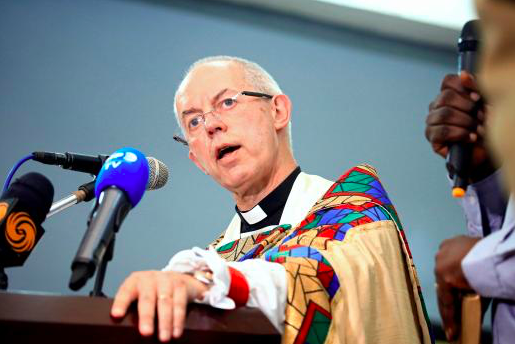Justin Welby's 'Reimagining Britain': A political book from a political Archbishop of Canterbury
'The combination of massive economic shock and huge external change' after Brexit mean the UK is facing its greatest challenge since the end of the Second World War.
That is the essence of Justin Welby's latest book and those who think the archbishop should be a glorified Billy Graham issuing tub thumping gospel messages will be sorely disappointed. In Reimagining Britain: Foundations for Hope 'government' is mentioned more often than 'Jesus' and 'Brexit' more often than 'bishop'.
Welby tackles education, healthcare, housing, immigration and economics before reserving the final chapter for 'churches and other faith groups' as what he calls 'healthy disruptors'. It is a highly political book from a highly political archbishop of Canterbury.

'The next couple of decades or more [will be] a period of reimagination on the scale of post-1945,' he writes. 'The task of reimagining is far more complicated than after 1945 and the result will be a process lasting not for a few years but generations.'
It is not the first time Welby has entered into fraught political debates and it will no doubt not be the last. He has been heavily criticised, primarily from the Right and most prominently by former-UKIP leader turned Fox News commentator Nigel Farage, for his interventions on refugees and food banks.
But this is an archbishop more comfortable in the House of Lords than the general synod. He sees the Church of England's role as deeply political, caring for the physical as well as spiritual needs of its parishioners. During the 2013 debate on military intervention in Syria he watched the House of Commons debate intently from the peer's gallery before making a speech in the House of Lords. He sat on the Parliamentary Commission on Banking Standards from 2012-2013 and is a member of the IPPR Commission on Economic Justice. On top of this he regularly meets foreign political leaders and in the last year has met Vladimir Putin's ally Patriarch Kirill, Israel's Prime Minister Benjamin Netanyahu and more recently Turkey's authoritarian president Recep Erdogan in a low-key meeting in Ankara.
Reimagining Britain has drawn comparisons with the Church of England's fallout with Margaret Thatcher's government in 1985 over a report entitled Faith in the City, although Welby says the wholesale changes needed now are much more drastic than 'simply an adjustment' needed in the 1980s.
However Welby does not appear in the least bit afraid of potential clashes and weighs in freely on Sharia law, same-sex marriage, home ownership and, of course, Brexit.
He harshly criticises both sides of the referendum debate saying 'those wildly in favour sometimes seem to resemble Dr Pangloss, those who are most against risk giving the impression of channelling the depressed robot, Marvin the Paranoid Android, in The Hitchhiker's Guide to the Galaxy'.
He attacks second home owners and nimbys and urges the government to 'allow house prices to stabilise and return a home to being principally a good shelter in a safe and convenient location'.
And he avoids the layers upon layers of nuance over Sharia law that tied up his predecessor Rowan Williams and simply says it should never become part of the British legal system. 'Sharia, which has a powerful and ancient cultural narrative of its own, deeply embedded in a system of faith and understanding of God, and thus especially powerful in forming identity, cannot become part of another narrative,' he writes. 'It is either formative or different. Accepting it in part implies accepting its values around the nature of the human person, attitudes to outsiders, the revelation of God, and a basis for life in law, rather than grace, the formative word of Christian culture.'
But when asked what the 'red warning lights' were over what he had written, it was his relatively positive comments on same-sex marriage and the feared backlash from conservatives in the church that he said most worried him.
Those comments come in a chapter on the family which Welby told journalists was focused on being realistic about changes to the traditional household including cohabitation, divorce and same-sex marriage.
'Taking account of how things have changed, how do we makes sure we tackle those great evils of lack of care particularly for the vulnerable and the elderly?,' he said. 'There are some things I would say I don't like but that doesn't mean I pretend they don't exist.'
Ultimately, as with his immediate predecessor, it is these issues on which his time as archbishop may be judged. What will be the Church's standing at the end of his tenure? Can he hold together a Communion that could, and some even say should, split over sexuality?
Yes, he appears to be the ultimate political archbishop. Acutely aware of the established side of his office, Welby takes a different approach to that of Rowan Williams, who spent minimal time in the House of Lords and told my colleague James Macintyre in 2008, in the context of the disestablishment question, that 'being a nuisance to the people across the river is not a big consideration...It really isn't'. The incumbent does perhaps care a little more about what the political world is thinking and saying, and that is no bad thing.
But it is notable that while not immune, Welby is, similarly, not as fazed by criticism from outside the church as he is from attacks within it.
Welby has often spoken of his love for the 80 million strong worldwide Anglican Communion, and how he loses sleep over issues such as sexuality and abuse.
In the end, despite his preoccupation with politics, it is the prospect of increased schism under his watch that bothers him more than any backlash over his political interventions.











